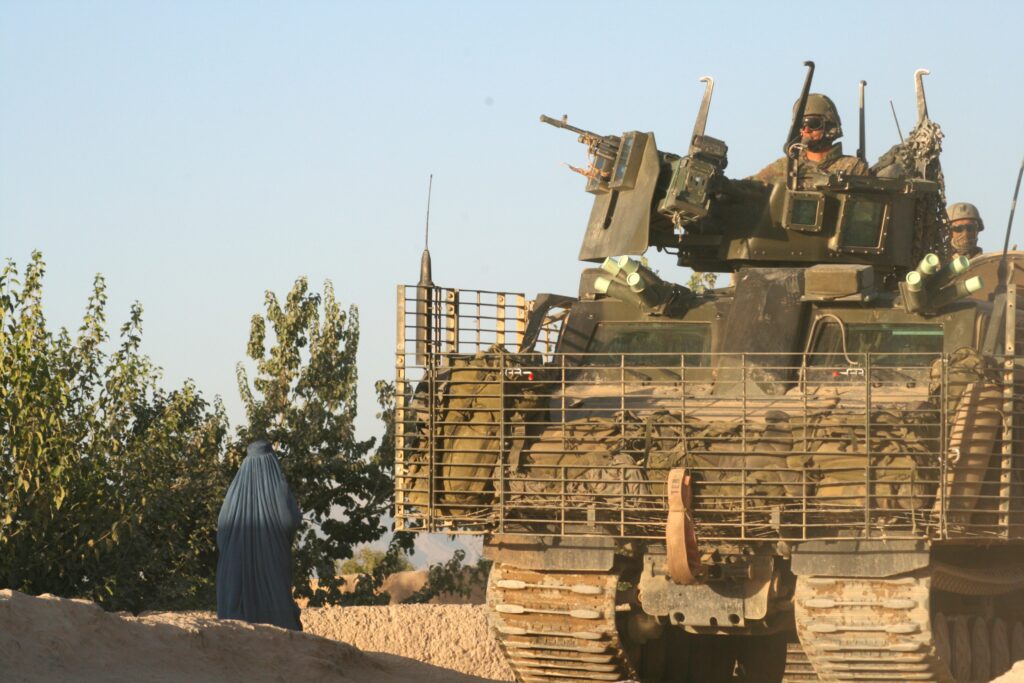Simply following an order or taking personal responsibility? Many soldiers operate on a higher moral plane.
In war zones, soldiers follow orders, but what if their conscience dictates otherwise? Naval chaplain Jan Peter van Bruggen investigated the personal responsibility of Dutch soldiers. His conclusion: Dutch law offers too little room for individual responsibility in the field.

Imagine: you’re a soldier in a war zone. The tension is palpable, your hands are sweating. A superior gives an order, but deep inside, something gnaws. What if that order clashes with your moral convictions? Can you ignore it, or must you obey, regardless of the consequences?
This question is central to the doctoral research of naval chaplain Jan Peter van Bruggen. After nearly 25 years of experience in the Ministry of Defence, he decided to examine the moral struggles of soldiers. His research, ‘Moral Boundaries in War Zones: Personal Responsibility of Dutch Soldiers,’ gives voice to a theme that often remains underexposed: how far does the personal responsibility of soldiers extend in the reality of orders, dangers, and questions of conscience?
More than obeying
At first glance, it seems simple: a soldier receives an order and carries it out. The idea that soldiers make decisions independently would be undesirable; it can lead to arbitrariness and chaos. But is that image correct?
According to Van Bruggen, the reality is much more nuanced. In his conversations with soldiers, he repeatedly heard that they felt they were making their own decisions as soon as they were operating in a war zone. This is because orders are rarely worked out in detail.
As one soldier summarized it: ‘As soon as we’re out of the base camp gate, the plan falls apart.’ Outside the base, soldiers have to improvise, respond to unexpected situations, and constantly adjust their actions. In that context, they feel their personal responsibility more strongly than ever. Sometimes this means adjusting the order and, in exceptional cases, even deciding not to carry it out at all.
When rules aren’t enough
This responsibility is most acutely felt in moral dilemmas. Van Bruggen cites the example of a soldier who was ordered to fire from a helicopter at a building where enemies were hiding: ‘He knew civilians were also present. According to the rules, he was allowed to shoot, but his conscience held him back. Because there was no immediate danger, he decided not to fire.’
‘Rules often function only as a moral floor in such situations,’ says Van Bruggen. ‘They indicate the minimum permissible level. But in reality, many soldiers act on a higher moral plane. Their reasoning isn’t: it’s allowed, so I’ll do it. But: it’s allowed, and yet I won’t do it, because it’s morally unacceptable.’

Legal issues
Yet, there’s a conflict here. Operationally, soldiers feel they have room to act morally, but legally, that room is practically nonexistent. According to national laws and regulations, soldiers are bound by the hierarchy and can hardly invoke moral choices that contradict orders.
International law, however, adopts a different approach. Since the Nuremberg trials, even those who ‘merely followed orders’ can be held personally responsible for their actions. This means that Dutch soldiers on international missions not only act for the government but can also be prosecuted for actions that later prove to be wrong.
Court
In 2007, the Battle of Chora took place in Afghanistan, where Dutch soldiers fought for control of the district. Dozens of people were killed by Dutch artillery fire during these clashes. Afghan civilians sued not only the Dutch state but also individual soldiers.
According to Van Bruggen, the government tried to protect the soldiers by referring to Military Law, which formally holds individuals less accountable. But international law sees this differently: those who use unjustified force cannot hide behind an order.
Anyone who thinks that international law gives soldiers the freedom to follow their own moral compass is mistaken. In practice, they have to wade through national law, which is actually counterproductive: ‘It offers little guidance and leaves no room to violate an order based on moral considerations.’
It is precisely this tension that forms the core of Van Bruggen’s message. ‘Current Dutch legislation offers soldiers little guidance when they are faced with moral choices and want to act differently than their assignment prescribes,’ he says. ‘I hope my research will contribute to a stronger moral position for soldiers in Military Law. This is fitting for a country that also hosts the International Criminal Court.’
Van Bruggen: ‘If we want to preserve humanity in future warfare, we must recognize that moral awareness lies not in the rules or with the government, but with the soldier who must make choices in the field.’







